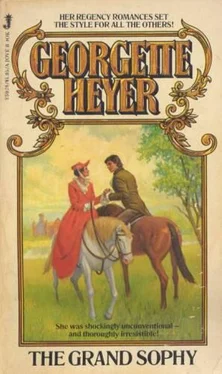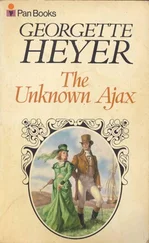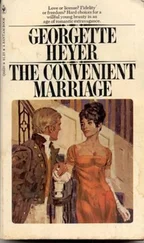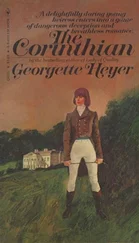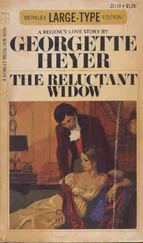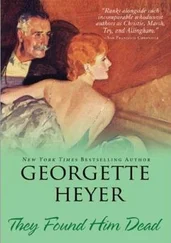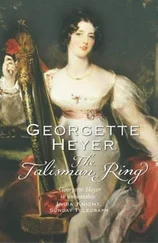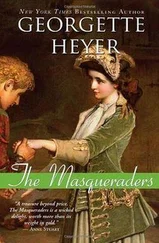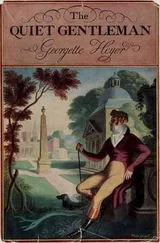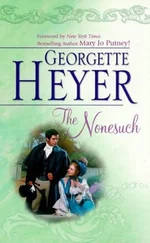“Mama, I hope I am not an unnatural daughter, but I had rather be dead than married to James!” declared Cecilia, raising her head. “He thinks of nothing but hunting, and when they do not have company in the evening, he goes to sleep, and snores!”
Daunted by this disclosure, Lady Ombersley could find nothing to say for a minute or two. Cecilia blew her nose, and added, “And Lord Charlbury is even older than James!”
“Yes, but we do not know that he snores, my love,” Lady Ombersley pointed out. “Indeed, we may be almost certain that he does hot, for his manners are so very gentlemanlike!”
“A man who would contract the mumps,” declared Cecilia, “would do anything!”
Lady Ombersley saw nothing unreasonable in this pronouncement, nor was she surprised that his lordship’s unromantic behavior had given Cecilia a distaste for him. She had herself been sadly disappointed, for she had thought him a man of sense, certainly not one to be succumbing to childish ailments at inopportune moments. She could think of nothing to say to palliate his offense, and as Cecilia had apparently no further observations to make, silence reigned uneasily for a time. Cecilia presently broke it, asking rather listlessly whether it was true that her uncle had been in the house that afternoon. Glad of an excuse to talk of more cheerful matters, Lady Ombersley at once told her of the treat in store for her, and had the satisfaction of seeing the cloud lift a little from her daughter’s brow. It was not difficult to enlist Cecilia’s sympathies on behalf of her cousin. She could scarcely envisage a more horrid fate than to be sent to stay for an indefinite period amongst relatives who were almost strangers, and warmly promised to do all that lay in her power to make Sophia feel herself at home in Berkeley Square. She could conjure up no very clear recollection of her cousin, for it had been some years since they had met; and although she had sometimes thought that to travel about Europe must be exciting, she had also suspected that it might also be extremely uncomfortable, and readily agreed with Lady Ombersley that such an unconventional existence was scarcely an ideal preparation for a London debut. The reflection that Sophia’s arrival in Berkeley Square must mean some relaxation of the almost conventual life imposed upon the family by Charles’s determination to economize sent her away to change her dress for dinner in a far happier frame of mind.
Four of the family sat down at the huge table in the dining room that evening, his lordship having decided to gratify his wife with one of his rare appearances at his own board. He was the only unconstrained member of the party, for he had a happy disposition which made it possible for him to remain oblivious to the most blatant signs of discontent in his companions. In the same spirit he contrived with amazing ease to be cheerful under the humiliation of being little more than his son’s pensioner. He had the greatest dread of being obliged to face unpleasantness, so he never allowed himself to think about unpleasant things, which answered very well, and could be supported in times of really inescapable stress by his genius for persuading himself that any disagreeable necessity forced upon him by his own folly, or by his son’s overriding will, was the outcome of his own choice and wise decision. While Charles continued to render him the observances of filial respect he was able to forget that the reins of government had been wrenched out of his hands; and when, as sometimes happened, filial respect wore a little thin, at least these regrettable lapses did not last for long, and were not difficult for a man of his sanguine temperament to forget. He bore his son no malice, though he thought him a dull dog; and provided that the luck was running his way, and he was not expected to bear any distasteful part in the management of his young family, he was very well satisfied with his lot.
He could hardly have been unaware of the dissension at present raging in his household, for a request from his wife that he should exercise parental authority over Cecilia had driven him posthaste to Newmarket not a fortnight before. But neither his son’s heavy frown nor his daughter’s reddened eyelids occasioned the slightest comment from him. He appeared to derive no small satisfaction from partaking of a lengthy meal in the company of an anxious wife, an injured daughter, and a glowering son. He said: “Well, upon my soul, this is very pleasant, to be dining en famille in this cozy way! You may tell your cook, Lady Ombersley, that I like this way of serving a duck. I declare I don’t get as good at White’s!” After that he recounted the latest piece of society gossip, and inquired affably how his children had spent the day.
“If you mean me, Papa,” said Cecilia, “I have spent the day just as I spend every day. I shopped with Mama; I walked in the Park with my sisters and Miss Adderbury; and I practiced my music.”
Her tone did not suggest that she had found these amusements exhilarating, but Lord Ombersley said, “Capital!” and turned his attention to his wife. She told him of her brother’s visit, and of his proposal that she should assume the charge of Sophia; and Lord Ombersley gave his gracious consent to the scheme, saying that nothing could be better, and congratulating his daughter upon her good luck in so unexpectedly acquiring a charming companion. Charles, who was irritated enough by all this bland insensibility to sympathize with his sister, said dampingly that they had as yet no reason to suppose that Sophia would be in the least charming. But Lord Ombersley said that he entertained no doubts on that head, and added that they must all do their best to make their cousin’s stay agreeable. After that he asked Charles whether he intended to go to the races next day. Charles, who knew that the races referred to were run under the patronage of the Duke of York, and would entail, for that jovial personage’s cronies, several evenings spent at Oatlands, playing whist for pound points, looked more forbidding than ever, and said that he was going down to Ombersley Park for a few days.
“To be sure you are!” agreed his father cheerfully. “I was forgetting that business about the South Hanger. Yes, yes, I wish you would attend to that, my boy!”
“I will, sir,” responded Mr. Rivenhall politely. He then glanced across the table at his sister, and asked, “Do you care to accompany me, Cecilia? I am very willing to take you, if you should like it.”
She hesitated. This might be an olive branch; on the other hand it might be a singularly futile attempt to wean her mind from thoughts of Mr. Fawnhope. The reflection that Charles’s absence from town might, with a little contrivance, make it possible for her to meet Mr. Fawnhope decided the matter. She shrugged, and said, “No, I thank you. I do not know what I should do in the country at this season.”
“Ride with me,” suggested Charles.
“I prefer to ride in the Park. If you desire company, I wonder you do not invite the children to go with you. I am sure they would be delighted to oblige you.”
“As you please,” he replied indifferently. Dinner at an end, Lord Ombersley withdrew from the family circle. Charles, who had no evening engagement, accompanied his mother and sister to the drawing room, and, while Cecilia strummed idly at the piano, sat talking to his mother about Sophia’s visit. Much to her relief, he seemed to be resigned to the necessity of holding at least one moderate party in Sophia’s honor, but he strongly advised her against charging herself with the office of finding a suitable husband for her niece.
“Why my uncle, having allowed her to reach the age of — twenty, is it? — without bestirring himself in the matter,” he said, “must suddenly take it into his head to persuade you to undertake the business, is a matter beyond my comprehension.”
Читать дальше
